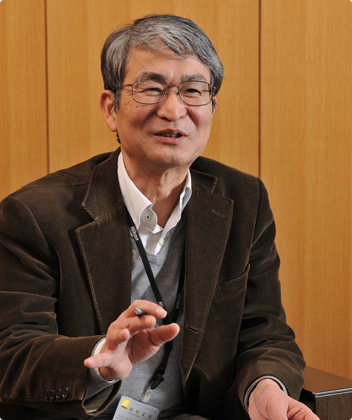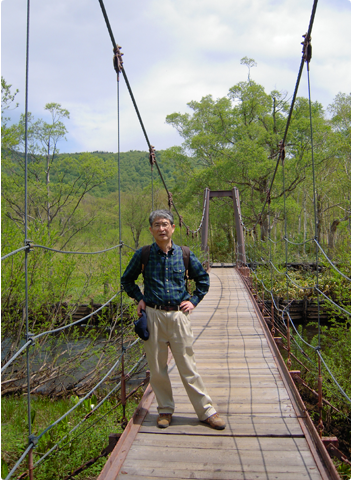Be bold, but be sensitive, too. Most of all, be someone that people can trust.
The "Tanaka academy" nurtures young optical designers for the future.
Mr. Tanaka, you seem very earnest in promoting education.
As I mentioned before, engineers who want to be optical design experts are not many in number. It is less common in Japan to teach optics at colleges or universities. However, the optical industry is one of the leading industries of Japan. Therefore, experts in our field have a great responsibility to nurture optical designers in Japan.

What training system do you use at Nikon?
Newcomers joining our optical design group at Nikon are free from any daily work during their initial year. Instead, for the whole year, they are requested to study basic optics — geometrical optics, wave optics and other sciences covered in optics textbooks, as well as learning how to use computers effectively, lens design or any other subjects related to the work of Nikon.
Who are the instructors?
Our laboratory engineers are the core instructors, and many other Nikon optical engineers also join in the lessons as instructors from various departments. Gaining knowledge from texts is quite different from acquiring it from active and highly talented engineers. Learning it in this way is quite an important and rare experience.
Your novices probably learn quite a lot from such intensive training during their first year.
One year is not long enough for them to become independent designers. However, a year’s training will enhance their knowledge of optics to a level where they can communicate with their senior field engineers. From the second year, these novices will be engaged in fieldwork and expected to continue their studies on their own.
It sounds like quite hard work is involved to progress at the "Tanaka academy". (Laughter) Do you give similar lessons outside Nikon, too?
Yes, I give lectures at training seminars for the Japan Optomechatronics Association. I’ve done this for the last 10 years. The number of trainees I’ve given lectures to exceeds 1,500 now. They are from various organizations in the industry. I may be quite well known by now, at least among optical engineers in Japan. (Laughter)
The importance of being a specialist in one category of technology.
What aptitudes do you think optical designers should learn to develop?

Masashi Tanaka, on vacation in Oze National Park, Japan
First of all, they need to nurture a bold mind. If there already exists a design that is fully functioning, designers might feel a certain reluctance to change it. However, they need to think of the possibility that there might be a better solution. It is important to step forward with courage when they see such a possibility. Engineers should be bold, or even audacious. They should think of it in this way — that even if they fail now, they should learn, at least, why they failed then and there. That might produce a clue to finding a new solution. Engineers should be brave enough to never be afraid of failure. Of course, they must be sensitive at the same time. If they pay strict attention to every detail, they will become qualified designers, worthy of their title.
So, you yourself must be bold, but sensitive.
Well, I am not sure. (Laughter) But I think I’ve trained myself to become accustomed to always view things from various different perspectives.
What would be your words of encouragement to novices as a frontrunner in optical design?
I would like to tell them that engineers must discover a unique specialty of their own. It is essential to find one’s own particular skill, while advancing the work of daily obligation. Designers should be known by their specialty — telescopic lenses, reflective lenses, zoom lenses, etc. This will help them establish their own reputation in the world of optical design.
Is it this spirit of professionalism that you wish your trainees to learn at your academy?
Indeed, I believe they are learning this. The future of the optical industry of Japan is dependent on these young engineers. My wish is that our knowledge and experience at the laboratory will contribute to nurturing these engineers for the benefit of the future.
